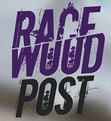A.J. Race's Blog, page 33
December 6, 2012
To Epilogue or Not To Epilogue?

 hen it came to book 2, there was a certain point at which my editor suggested that I should probably end the book at a certain chapter and make that the epilogue. I disagreed, mostly because first of all it’s only the second book in the trilogy, wouldn’t an epilogue be a little premature? But second, I didn’t want to end it there. So I didn’t. But it did get me thinking… does the rule for prologues also apply to epilogues? At what point is an epilogue better than simply a final chapter? What’s the difference and can you write an epilogue that maybe should have just been the next/last chapter?
hen it came to book 2, there was a certain point at which my editor suggested that I should probably end the book at a certain chapter and make that the epilogue. I disagreed, mostly because first of all it’s only the second book in the trilogy, wouldn’t an epilogue be a little premature? But second, I didn’t want to end it there. So I didn’t. But it did get me thinking… does the rule for prologues also apply to epilogues? At what point is an epilogue better than simply a final chapter? What’s the difference and can you write an epilogue that maybe should have just been the next/last chapter?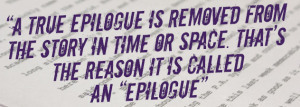
According to Writer’s Digest : “A true epilogue is removed from the story in time or space. That’s the reason it is called an “Epilogue”; the label serves to alert the reader that the story itself is over, but we are going to now see a distant result or consequence of that story.”
This is a wonderful definition and I like that the whole of the article was about ways in which to end a novel, it is perhaps one of the most challenging elements in writing fiction, next to starting a novel. But somehow I’m not sure this entirely answers my question (at least with regards to my own novel). See when it comes to book 3, I have known for a long time how it’s going to end and for a while now I’ve been sort of debating whether or not it ends on an ‘Epilogue’ or just Chapter 46 (whether or not I actually make it to 46 is going to be debatable but that’s my goal). Technically speaking the ending is removed from both the story time and space and it’s sort of a consequence of the story, but it’s not actually a scene per se, which makes it a little harder to name.
Technically, it is my story so in theory I could title the final chapter anything I wanted, but if I’m going to call it an “Epilogue” I’d like it to really be an epilogue. Honestly I actually haven’t read all that many novels that have epilogues to them so as a literary device I kind of feel like most authors either don’t care for them or don’t feel they are entirely necessary. There are a lot of ways to end your novel, especially if it’s a series (or in this case a trilogy). You can end on a cliffhanger (as in the case of book 2) or even a complete plot-twist, or a full drawn out ending. Or… you can write an epilogue. An end within an end, if you will. I think especially for a series epilogues are a good idea because it can give you some amount of finality to the entire storyline,



December 5, 2012
My Biggest Inspiration

 y mother has always been my biggest supporter and champion in everything. She has always been my number one fan and the one person I could always count on to tell me when to keep going and sometimes when I should try something else. She is the most inspiring person I know and like most inspiring people her life has never been an easy one. In fact, the more I learn over the years that she tells me about the more I’m both horrified, at times, and inspired more at others. We’ve often joked that her life would make the subject of a really great Lifetime movie, but I think her life would make a more interesting memoir or perhaps a novel.
y mother has always been my biggest supporter and champion in everything. She has always been my number one fan and the one person I could always count on to tell me when to keep going and sometimes when I should try something else. She is the most inspiring person I know and like most inspiring people her life has never been an easy one. In fact, the more I learn over the years that she tells me about the more I’m both horrified, at times, and inspired more at others. We’ve often joked that her life would make the subject of a really great Lifetime movie, but I think her life would make a more interesting memoir or perhaps a novel.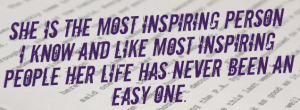
Unlike me, my mother doesn’t write. She doesn’t really have an interest in writing, and these days the only thing she reads is my work (whenever she’s not working herself), and though various elements of my books in previous have been instances she’s experienced I’ve never written a full book that would, in itself, be a memoir (or I guess biography if I wrote it). A long time ago I discussed her writing a memoir or at least my ghost writing it for her and she was actually really interested, but for one reason or another things got in the way and that fell by the wayside. Elements from her life will probably make it into a lot of novels I write over the course of my life, but I really want to write a novel that is exclusively her story.
Why not a ghost written memoir? For non-fiction writers this may seem hard to believe but for fiction writers you will probably understand: I don’t like to be completely bound by reality. Here’s the thing about my mother, yes it’s been a lot of crazy things over the years but I also want there to be enough of a difference between the novel and the actual events (besides just changing names) that nobody like her ex-husband for instance, could come back and try to sue for libel. And I’m doubting he’s the sort of person who would just sign away his legal right to sue anyone for any reason. (He fancies himself a lawyer sometimes). I also don’t want to do a memoir because like me there are certain parts of her life that are too painful to remember in explicit detail and still others that she was simply too young to remember. Thoughts and actions of a particular person (like her brothers and sisters) she couldn’t possibly be expected to know. Her story is a story that needs to be told, if for no other reason so that maybe others can avoid some of the pitfalls she found herself in, or even just to help someone in a similar situation feel like they are not alone. Maybe that’s why I’m a writer. Maybe it’s my job as a writer to make sure that her story is told. And I’m going to do it.
Just… maybe not any time soon.
I also, won’t tell anyone when it’s coming, so you may never know which one is really real. Cause I’m evil like that.


December 4, 2012
Ethnical Difficulties

 eople have really weird issues with race, sex, and sexuality; we define ourselves in such strict little boxes that it’s almost dizzying. Man or woman. Gay or straight. Black or white. But nothing is really black and white is it? Even photographs have shades of grey. (Insert desired 50 Shades joke here). I can’t say for sure but I feel like this is largely an American problem, and one that we’ve created for ourselves.
eople have really weird issues with race, sex, and sexuality; we define ourselves in such strict little boxes that it’s almost dizzying. Man or woman. Gay or straight. Black or white. But nothing is really black and white is it? Even photographs have shades of grey. (Insert desired 50 Shades joke here). I can’t say for sure but I feel like this is largely an American problem, and one that we’ve created for ourselves.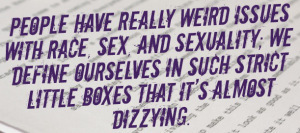
For a long time now the politically correct way in which to describe a person who is for lack of a better word of color (or black–which fun fact for non-artists. Black is actually the absence of color. White is all the colors combined so technically white people are the ones who are “of color”) and American is to call them African American. So how would you describe a character who’s British and black? African British? or African English? I don’t think that’s a thing.
There’s also: Native American to describe what we previously called Indians (because the idiot who found this place thought he was somewhere else). Asian American, Latina/Latino or Hispanic American, LGBT American… but it gets dicey because not all Asians, Hispanics or LGBT individuals are the same are they?
They’re blanket terms, but if someone is Filipino they are not from Asia. As the term Asian assumes. Mexican is usually a blanket term for a Hispanic person however Mexicans are from Mexico, which is far from Spain where the term Hispanic comes from. Latino refers to people who are from Latin America as the name suggests, yet people use them as blanket terms to describe someone who is in essence not-white or Caucasian as the P.C. term dictates. Ironically according to the dictionary, caucasian is actually considered often offensive in itself. Also on the whole African American front what of those who have never been to Africa, know nothing of the continent and maybe weren’t even from there to begin with? I mean African American is also a term we use to describe people who appear to be dark skinned but could very well be from Jamaica or a similar island nation. It’s worth noting that you can be “white” and still technically an African American if you were born in Africa then moved to America. What box do you check then? You’re LITERALLY an African-American, except by definition of race you’re technically caucasian. In case you were wondering that was a reference to the film Mean Girls.
I’m not trying to be divisive or offensive I’m trying to make a point. We define ourselves in such strict terms and the reality is nothing is clear cut. There’s a huge grey area that we tend to overlook and sometimes maybe even ignore because it doesn’t suit our interests. Race and sex and sexuality shouldn’t be political issues that determine whether or not a candidate is worthwhile… but it is. Actually the reason I mention this at all is two-fold. I do want to have characters who are more than just caucasian, but I actually don’t want to offend anyone by describing them in the wrong way. Don’t get me wrong I don’t mind offending people in certain ways, just not because of how I try to explain a character’s ethnic background.
Further proof this is more of an American issue than anywhere else… Here is how Kingsley Shacklebolt was introduced to us in chapter three of Harry Potter and the Order of the Phoenix:
“And this is Kingsley Shacklebolt”– he indicated the tall black wizard, who bowed–”Elphaias Doge…”


December 3, 2012
The Evolution of Racewood
 rom Race to Fame to the Daily Racewood, it’s been a long six years, and I’d like to think I’ve come quite a long way… maybe? Today in my copywriting class (this being Monday the 26th as I am writing), my friends and I got a little nostalgic looking up toys and technologies from our youth. This of course may seem a bit ridiculous to people who are older than us (I’m the oldest of all of us at 21), but the truth is just in the last ten years, things have really really changed.
rom Race to Fame to the Daily Racewood, it’s been a long six years, and I’d like to think I’ve come quite a long way… maybe? Today in my copywriting class (this being Monday the 26th as I am writing), my friends and I got a little nostalgic looking up toys and technologies from our youth. This of course may seem a bit ridiculous to people who are older than us (I’m the oldest of all of us at 21), but the truth is just in the last ten years, things have really really changed.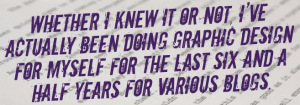
The technology is better sure, but it’s nice to look back on the things you loved. This is not necessarily a nostalgia post in the sense of all things 90′s related. This is about the evolution of my brand. If I’m one hundred percent honest with myself, I don’t think I actually ever got really serious about blogging until 2011, mostly because that was when I started doing it daily. But this isn’t about the writing, this is a design post. Graphic design isn’t something that is particularly new to me, whether I knew it or not, I’ve actually been doing graphic design for myself for at least the last six and a half (maybe seven) years for various blogs. Be forewarned, some of these graphics are a little terrifying. (At least to me). And in researching this particular blog post (by going back through my external HD, one thing I’ve come to realize is that the Cult of Racewood brand has actually seen a lot more changes than even I realized over the last five years. I was sure that I had only changed bits and pieces here and there and that most of my extensive changes have been made this last year, but apparently, I’ve been like this for years.
I can’t honestly say I remember the what the first graphics I created for my blog but my earliest recollection of creating graphics was for the Race2Fame blog and later podcast.
It’s funny to see all of my old work, once upon a time I thought many of these were good, and when you consider that I didn’t have photoshop or InDesign or Illustrator for any of these sometimes they do seem pretty cool.
So, what’s next for the Daily Racewood? Do I change my graphic yet again in 2013, as my little mystery question mark (sort of) suggests?
Truthfully. Probably not.
In all actuality, I like my post graphics. I suspect my page graphics may (keyword may) change with the coming of TDR Radio in the spring, but for the first time in a while I’m really really happy with my post-graphics. Of course, as my good friend and fellow writer Katrina pointed out to me, “While you may not change anything at the beginning of 2013, the idea that you won’t probably want to change things before 2014 is highly unlikely” and she’s right. For now however, whatever happens in 2013 with regards to changes and this blog is a mystery. What do you think? Do you enjoy the graphics and my latest addition of quotes taken from the post and given it’s own little graphic, that may have possibly contributed to my winning my first Beautiful Blogger award? I’d love to hear your thoughts.


December 2, 2012
Seriously?!
 aking a page from one of my favorite bloggers Jordanna East I decided to write my very own attempt at Jerks & Irks.
aking a page from one of my favorite bloggers Jordanna East I decided to write my very own attempt at Jerks & Irks.
As a general rule I try not to take anything personally. I’ve heard it all or, until recently, so I thought. The other day a blog post of mine entitled Publishers Take Note which was, about my belief that publishers should try to embrace new technologies and realize that printed books were not going anywhere, got me into a rather heated discussion with another blogger who clearly misunderstood what I was trying to say, and made some comments that to my mind were a little insulting. I won’t go into the nitty gritty, suffice it to say, you can see our exchange on the page, even though they suggested that I could in fact delete it if I so chose, I didn’t. Frankly I will happily admit that perhaps my opinions on Fifty Shades are at best melodramatic. But as this is my own personal blog, with my own personal opinions and I am not personally affiliated with anyone, I really don’t know why they felt the need to comment as they did.
Yes, 50 Shades is popular. No, it’s not the end of the world, or even literature and I never said it was. If you misunderstood the point of that post, I’m sorry, but I can’t change how someone reads what I write. End of story. I’m not going to go on about this, because it’s not worth it. We had a difference of opinion, and I was not going to change their mind and they weren’t going to change mine. After a while commenting at all sort of felt like beating a dead horse, but I believe that as the author of this blog, if someone makes a comment (and I do so love comments  ) then I should take the time to respond. At the end of the day this is my blog and my opinions and if you don’t agree no one’s forcing you to listen to me. I love and appreciate all my followers (of which this person was not one by the by), but if you really don’t like what I say, I’m not going to change just to please everyone else. And I shouldn’t have too.
) then I should take the time to respond. At the end of the day this is my blog and my opinions and if you don’t agree no one’s forcing you to listen to me. I love and appreciate all my followers (of which this person was not one by the by), but if you really don’t like what I say, I’m not going to change just to please everyone else. And I shouldn’t have too.


December 1, 2012
A New Set of Challenges
 fter I self published my first novel I decided to create a post discussing some of the lessons I learned along the way, and as I imagined the lessons keep coming. One of the biggest lessons I’ve learned in writing and producing the sequel is that all books are not created equal.
fter I self published my first novel I decided to create a post discussing some of the lessons I learned along the way, and as I imagined the lessons keep coming. One of the biggest lessons I’ve learned in writing and producing the sequel is that all books are not created equal. 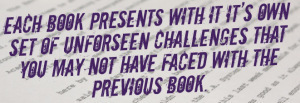
When I started writing Goddess of Carnage after Bridge of Memories came out in February, I was under the impression that producing book two would be easier because I knew a lot more than I did with book one. I had been through the experience once already, and for the most part I was pretty sure I had gotten all the bugs out of the process. I had a timeline all set out in my mind of how this was going to work, and within the course of several months that entire timeline that encompassed the better part of 2012, was derailed by several events which I was unable to control, thus forcing me to create an entirely new timeline for the next year, year and a half. But here’s the thing about timelines when it comes to writing… each book presents with it, it’s own set of unforeseen new challenges that you may not have faced with the previous book, and which make it impossible to predict what will await the next one. Goddess of Carnage is 30k words longer than Bridge of Memories which means that editing such a novel took longer than I had expected because much of my basis for how long things like editing should have taken was based on a book on a much smaller scale. In addition, Goddess of Carnage has gone through far more rigorous editing than Bridge of Memories before it, and in so doing has presented the challenge of making sure that I am able to do what needs to be done while still following the latest timeline I set out for myself with the announcement of Goddess of Carnage’s publication date. Having been through the process of creating the interior file for book one already I was pretty sure that this would be another area I would not have any difficulty in. However changing the size of the novel caused me a bit of trouble, and again the length was a whole new challenge that I was forced to face.
All of this is information that I now have to remember regarding what would be my planned timeline for book 3, because like Goddess of Carnage, book 3 is going to be longer. In fact, book 3 will be the longest book I’ve written to date and more importantly with any luck, almost 70k words longer than Bridge of Memories. Which means a potentially longer edit time and by extension more time between when how long I want this to take me and how long it will actually take. I can’t predict what fresh hell book 3 will create for me, but hopefully the lessons I’ve learned during the process of my first two books will be carried through into the final book in the Secrets of Witches Trilogy.


November 30, 2012
The New Normal?
 fter Penguin Publishing got into some hot water for their self publishing service, which I initially hailed as brilliant until I researched more, I wondered if other publishers would do the same. Well wonder no more because Simon and Schuster has just announced their plans for a self publishing solution. But don’t get too excited, like the Penguin option Simon and Schuster is not self publishing per se as much as it is vanity publishing with prices reaching as high as a whopping $25,000 for business book package according to the NYTimes. With no ties to Simon and Schuster however it seems difficult to justify the price. Sure the book will have professionals working on it, or at least so they claim but, what do you get for really get for that price?
fter Penguin Publishing got into some hot water for their self publishing service, which I initially hailed as brilliant until I researched more, I wondered if other publishers would do the same. Well wonder no more because Simon and Schuster has just announced their plans for a self publishing solution. But don’t get too excited, like the Penguin option Simon and Schuster is not self publishing per se as much as it is vanity publishing with prices reaching as high as a whopping $25,000 for business book package according to the NYTimes. With no ties to Simon and Schuster however it seems difficult to justify the price. Sure the book will have professionals working on it, or at least so they claim but, what do you get for really get for that price?  The least expensive package is roughly the same as the second cheapest MacBook Pro. $1599. And is only for a children’s book. Assuming you want to publish an actual full length novel you can expect that it would probably be around $3,000-$10,000. (I’m guessing). Sure you are getting the distribution of Author Solutions who Simon and Schuster created this deal with, but that is still no guarantee of anything. It’s also worth noting that Author Solutions is currently owned by Penguin Publishing who is of course a competitor of Simon and Schuster. Author Solutions also owns the self publishing imprints, iUniverse, Author House, Xlibris (who is known for their own very expensive publishing packages) and Trafford (among others). Over the years, Author House has been embroiled in several scam complaints and were the subject of a lawsuit in 2006 (the lawsuit was of course an issue of libel, not necessarily of being a scam) but a quick Google search of Author House will produce many results for Author House and Scam. The popular site Preditors and Editors (which I found through Writer’s Digest) lists both Author Solutions and Author House in particular as Not Recommended. And as vanity publishers, which is a very important distinction. Calling this new venture that charges such an incredible amount ‘self publishing’ can be confusing for new writers who want to self publish and believe that it has to be expensive. I have been, admittedly fortunate in a lot of respects with regards to how much this venture has cost me and though the return on investment has not been high (as of yet) with all of the scandal that has surrounded Author Solutions and it’s subsidiaries for years now and continuous blog posts from frustrated authors who have dealt with them, it’s a wonder what Penguin and Simon and Schuster were thinking? Ultimately when considering in what way you should publish your first novel one has to consider a cost-benefit analysis. Can you reasonably put a price on your book, and if you could would it be $1600? Considering that most self published books probably never make that back, I suspect you’d have to really weigh whether or not its worth it. I don’t like the idea that publishing should ever become a rich mans game. That isn’t right nor is it fair. Still with a major publishing house like Simon and Schuster behind them, and the second major publishing house to do so. One has to wonder… Is this the new normal in publishing? Or just a fluke? Who do you think will be next?
The least expensive package is roughly the same as the second cheapest MacBook Pro. $1599. And is only for a children’s book. Assuming you want to publish an actual full length novel you can expect that it would probably be around $3,000-$10,000. (I’m guessing). Sure you are getting the distribution of Author Solutions who Simon and Schuster created this deal with, but that is still no guarantee of anything. It’s also worth noting that Author Solutions is currently owned by Penguin Publishing who is of course a competitor of Simon and Schuster. Author Solutions also owns the self publishing imprints, iUniverse, Author House, Xlibris (who is known for their own very expensive publishing packages) and Trafford (among others). Over the years, Author House has been embroiled in several scam complaints and were the subject of a lawsuit in 2006 (the lawsuit was of course an issue of libel, not necessarily of being a scam) but a quick Google search of Author House will produce many results for Author House and Scam. The popular site Preditors and Editors (which I found through Writer’s Digest) lists both Author Solutions and Author House in particular as Not Recommended. And as vanity publishers, which is a very important distinction. Calling this new venture that charges such an incredible amount ‘self publishing’ can be confusing for new writers who want to self publish and believe that it has to be expensive. I have been, admittedly fortunate in a lot of respects with regards to how much this venture has cost me and though the return on investment has not been high (as of yet) with all of the scandal that has surrounded Author Solutions and it’s subsidiaries for years now and continuous blog posts from frustrated authors who have dealt with them, it’s a wonder what Penguin and Simon and Schuster were thinking? Ultimately when considering in what way you should publish your first novel one has to consider a cost-benefit analysis. Can you reasonably put a price on your book, and if you could would it be $1600? Considering that most self published books probably never make that back, I suspect you’d have to really weigh whether or not its worth it. I don’t like the idea that publishing should ever become a rich mans game. That isn’t right nor is it fair. Still with a major publishing house like Simon and Schuster behind them, and the second major publishing house to do so. One has to wonder… Is this the new normal in publishing? Or just a fluke? Who do you think will be next?


November 29, 2012
Publishers Take Note
 he traditional publishing industry has a lot to learn if they hope to survive the next ten years. Like the music, movie and t.v. industry before them, publishers are going to have to move into the 21st century and embrace ebooks rather than continue to fear them.
he traditional publishing industry has a lot to learn if they hope to survive the next ten years. Like the music, movie and t.v. industry before them, publishers are going to have to move into the 21st century and embrace ebooks rather than continue to fear them.
Depending on who you ask, the 50 Shades phenomenon was sort of a knee-jerk reaction by the traditional publishing industry in response to the sudden popularity of the $.99 ebook crazy that has taken over in traditional publishing. And if that’s the case, I’m a little more sympathetic to their plight. The problem is, publishing a book that really should have stayed in the self publishing world (as one of the many we weren’t exactly proud of) isn’t the answer. Sure it’s brought them a great amount of success but at what cost? Here’s what the publishing industry needs to understand first and foremost. 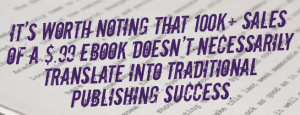
Printed books aren’t going anywhere, because bibliophiles wouldn’t stand for it. There many not be many of us left in the world, or even in America, but as long as lovers of books still remain, the printed word will never be gone. I love ebooks, a lot more than I ever thought I would, but there’s something about having a full library and holding a book in your hand that you can’t replicate with an ebook, no matter how hard Apple tries. And as far as readers are concerned, one of the lessons I’ve learned from the process of self publishing is that the smart readers will always buy a first edition hardback because (particularly if it’s signed) it’ll be worth something later (assuming the author is famous or becomes famous) not to mention, it’s far more valuable sentimentally.
Second publishers need to realize that while self publishing has taken off considerably, there are still many authors who wish to seek traditional representation. I seriously doubt that will change.
It’s also worth noting that 100k plus sales of a $.99 ebook doesn’t necessarily translate into traditional publishing success. This is a lesson publishers are starting to find out the hard way. Traditional publishers are offering self published authors who sold a large number of books on their own 6 and 7 figure book deals, the problem is, just because you can sell 100k or more of a book that’s a dollar, doesn’t necessarily mean that people will want to buy it when it’s $10. Stories of this success would have you believe that selling a 100k in a year is pretty easy. Especially at $.99, but with hundreds of new books being self published every day, it’s not as easy as it sounds, but just because a few have been lucky enough to make it, doesn’t necessarily mean that such a story will be able to continue to have commercial success.
I think one of the biggest lessons the traditional publishing industry is going to have to eventually learn is that the ebook version of a novel can’t be the same price as the print model. It just can’t, there’s nothing particularly special about 99% of ebooks that cost the exact same amount as their print counterparts and considering how easy it is to make an ebook file that looks just as good as an ebook. (Kindle offers a special InDesign plugin. I’m sure others offer the same for larger publishing houses). It’s not that difficult.
The traditional publishing industry doesn’t have to collapse in on itself, if they can learn the lessons of other companies, and move into the future, they can continue to thrive. Or, they can fear the future, and keep publishing 50 Shades knockoffs. The choice is theirs. And sadly I highly doubt their going to take the advice of a 21 year old self published, virtually unknown, author.


November 28, 2012
Master of Bulls*!&
 hat is a writer? It is the most fundamental question we writers ask ourselves. Some of us, would like our readers to believe that it’s something flowery and spiritual like writers are speakers of the soul or some such nonsense. But the truth is, writers are masters in the art of bullshit.
hat is a writer? It is the most fundamental question we writers ask ourselves. Some of us, would like our readers to believe that it’s something flowery and spiritual like writers are speakers of the soul or some such nonsense. But the truth is, writers are masters in the art of bullshit.
Particularly creative writers.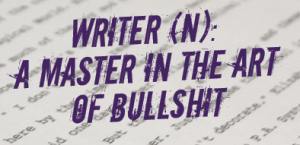
Why do I say this you ask? Consider any other writing versus a novel’s version of the same events. If someone asked you what color the sky was what would you say? Blue? Maybe with tinges of red or yellow depending on the time of day. What do writers say?
Azure blue, with fluffy white clouds that hung in the sky like cotton balls, on a cloudy day. This particular day however the clouds had started to look like a puppy… and so on.
It’s not the greatest example but do you see my point? Two different explanations all that get the same point across. The sky was blue. End of story. But writers, we live for bullshit. Most writers (if your like myself) were probably especially good when it came to English class and writing an essay. While the other students complained at having to write a 3 page essay I was done within like thirty minutes. I’m not bragging, I only mean to say that I learned at a young age what being a master of bullshit meant and I embraced it. I don’t call writers masters of bullshit to be derogatory. On the contrary, I use it with love and respect, I think we should embrace our bullshit. Mrs. Dalloway is the story of a woman’s entire life within a 24 hour span. Only a master bullshitter could make 24 hours span an entire novel. You want a list of my day in 24 hours?
Sleep 5-6 hours (if I’m lucky and rarely ever at night).
Edit: 2-3 hours (never all at once).
write: 2-3 hours (again never all at once)
watch t.v. online, blog, check Facebook, Tumblr, Twitter.
Eat somewhere in that mix. School on Mondays and Tuesdays and that’s it. Including showers and maybe getting a little in depth with a schedule (if I had one) that’s at most half a page? Double spaced. Maybe not even then. An epic novel if I ever heard one.
I’m not saying that my life doesn’t have interesting moments, and that truthfully one day couldn’t be the most fascinating day of your life and change everything and make a great novel, but it isn’t very likely and even at that one day probably wouldn’t be a very long novel. Maybe a novella, or a short story. But hardly an epic novel. Good novels, in fact great novels, (in my mind) span the better part of a characters life. Maybe even beyond his life. It isn’t just one day, or even one week. It’s months, maybe even years. Things change, fast in life. And sure six months can be pretty life changing, hell even six weeks can feel like an entire novel of time (believe me I know). But we are still masters of bullshit. And I believe, it’s time we embrace the mantra, and change the dictionary definition to read:
writer (n): a master in the art of bullshit.
That will never happen. But then let’s be honest… this entire blog post has been a mastery of bullshit. I you could have read maybe a sentence and gotten the gist of the whole post. I probably could have made my point with a sentence, but it’s much more fun to prove my point this way than simply writing one sentence and leaving you to guess what the hell I was going on about today.
It’ll be in the Cult of Racewood Dictionary of Misunderstood and Misused Words.
PS: I’m pretty much basing my entire knowledge of what Mrs. Dalloway is about from the film the Hours, which by the way is amazing, I want to read Mrs. Dalloway, but haven’t gotten around to it, so if I missed the point of the story, I apologize to all Virginia Woolf fans.


November 27, 2012
What’s in a Genre?
 f there was one question I wish people would stop asking it is the following: Oh you’re a writer? What genre to you write in?
f there was one question I wish people would stop asking it is the following: Oh you’re a writer? What genre to you write in?
I love that people are interested in the fact that I’m a writer, and as a general rule I love being asked questions, I could talk about writing for days (clearly if you’ve seen this blog) but the reason I dislike this question so much and all it’s many derivatives. Is because every time I give them my honest answer they look at me as though I have three heads. 
I don’t really like to be bogged down in one genre. I reply, waiting for the look of confusion, perhaps, shock, and horror.
You’ve gotta have a favorite. Do I? I wasn’t aware I had to do anything.
If you want the honest truth, the closest thing I can say I have to a genre that I can pretty much promise you will always find my books in, is LGBT. And that’s a pretty BROAD spectrum. True, currently I am writing Fantasy, I like fantasy, I love writing it, I love reading it. But I don’t want to spend my whole life doing it. I want to branch out. Maybe do romance, historical fiction, action, political drama, thriller, super spy thriller, contemporary. I mean if you think about it in realistic terms, no book is just one genre. Bridge of Memories alone probably constitutes, romance, political thriller, fantasy, a dash of horror (maybe?), a little action, a little light erotica (or is that just romance). What makes it mainly fantasy and not the rest of those things is that we prefer if a book have one or two genres at most. What are the CORE themes of your novel? That’s what set’s the genre, the core themes of all my novels is powerful gay characters, and drama (which I suppose is more of a theatre/t.v. term) but if you insist on putting me in a genre, because I get it, authors have made quite a killing by sticking in one genre. Danielle Steel (I see what you did there E.L.James), Stephen King, John Grisham and the like. They’ve made their living off writing one specific genre. They are what I like to call serial authors. They write the same book, over and over, using different characters, perhaps different locales, (unless your Stephen King) and somehow people continue to read it as if they’ve never seen it before. Sure the dialogue and characters are different but I imagine there are only so many love stories, and ghost stories and dirty lawyer stories you can tell before they all start to blend together. Unless you want to write about a dirty lawyer who doesn’t know he’s dead and falls in love with a live person who for some reason can see him.
OH GOD.
I may have created a monster.
Or a best seller.
Who knows.
The point is, for the most part it’s all been done before, so why would you want to stay in the same genre and keep doing it forever? Ten years of Secrets has been enough. If I don’t write another fantasy novel for another twenty years I would be very happy. I like it, but I don’t have the patience or the energy to write the same thing. I like variety. Call me crazy, but I don’t want to be stuck in the same genre. Maybe when I’m in my thirties or forties (like the aforementioned authors) I’ll want to write one genre forever, but for now, my genre is Gay, Fiction. See book for more specific details.












